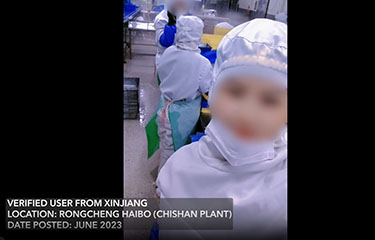Editor's note: A paragraph on communications between U.S. companies and The Outlaw Ocean and SeafoodSource has been adjusted to further specify the correspondence with the companies named in the report.
The Outlaw Ocean Project, which released a report in October implicating seafood processed with Uyghur labor is making it into the U.S. seafood supply chain, has released a video highlighting how it gathered its information.
The video highlights the efforts that Outlaw Ocean Project investigators and private investigators hired in China went through to accumulate evidence of Uyghur labor and forced labor being used by Chinese processing companies. It also documents evidence of companies in China fishing illegally in North Korean waters, in violation of United Nations sanctions.
The video focuses on the Chishan Group, a major Chinese seafood firm responsible for producing as much as 17 percent of processed squid imported by the U.S. from China. The Outlaw Ocean Project said it gathered extensive evidence the company is using Uyghur labor at its processing facilities. Under the U.S.’s Uyghur Forced Labor Protection Act (UFLPA), goods produced using Uyghur labor are not allowed to be imported into the country.
Evidence presented in the video also indicates the company is also sourcing seafood from vessels fishing illegally in North Korean waters, and exposes the Chishan Group’s ties to vessels alleged to have used forced labor. Much of the evidence was gathered by the Outlaw Ocean Project from existing media, some of which came from the companies under the Chishan Group.
“You log onto the Rongcheng Haibo website, the first picture you see is of a vessel that was tracked fishing in North Korean waters in the last five years,” Outlaw Ocean Project Open Source Investigations Editor Joe Galvin said in the video. The vessel in question, the Lu Rong Yuan Yu 809, is a squid jigger that as of 29 November is still feature on the company’s front page.
“It’s the first thing you see on the website,” Galvin said.
Another piece of evidence is a newsletter from the company reporting on the Chinese government’s assistance with its labor struggles through the acquisition of Uyghur workers from Xinjiang province.
“The Chishan Group released newsletters in which it described severe bottlenecks at its seafood processing plants in Shandong,” Outlaw Ocean Project Research and Investigations Editor Daniel Murphy said in the video. “The solution, which was offered to Chishan Group by Shandong government officials, was to start bringing workers from Xinjiang.”
The importation of workers from Xinjiang is also further documented through internal staff newsletters.
“The issue of labor transfer of Xinjiang was extensively discussed, there was celebrations for the first arrival of Xinjiang workers with photos of the Xinjiang workers arriving,” Galvin said. “There was discussion about the dietary needs of these Muslim workers, predominantly Muslim workers. So it was all very openly discussed in Chishan’s own corporate literature.”
Chinese state media also publicly lauded the labor transfers, Urbina said.
“In China, the labor transfer program is branded as a form of poverty alleviation, so state-controlled news outlets report on it pretty widely and openly, often painting a rosy picture of grateful workers and patriotic corporations,” Urbina said in the video.
The Outlaw Ocean Project further documented the presence of Uyghur labor in Chishan Group’s processing plants by using social media, specifically the platform Douyin – the Chinese counterpart to TikTok.
“We really wanted to verify in 2023 that there were still Uyghur workers at these factories, and in order to do that we turned to social media,” Murphy said.
Videos taken by workers showed them on the processing floor, with logos and other information visible enough that The Outlaw Ocean Project could tie them directly to the Chishan Group. Other videos, from workers walking outside the processing plants, could be matched with satellite imagery of the area to confirm that the workers took the videos at some of Chishan’s facilities.
Despite the extensive evidence in their own corporate materials, Chishan Group subsidiaries Rongcheng Haibo Seafood Co. and Shandong Haidu Ocean Product Co. denied illegally employing Uyghur laborers. But echoing other Chinese critics of the Outlaw Ocean report, the China Aquatic Products Processing and Marketing Alliance (CAPPMA), which represents China’s seafood industry, refuted the conclusions of the Outlaw Ocean report.
“The report, without any factual basis, speculates that employing Uyghur workers is equivalent to forced labor and encourages companies in the U.S. and E.U. to boycott seafood from related Chinese processing plants which have been falsely alleged. This is highly irresponsible,” CAPPMA said. “The continuous spread of the news has resulted in some buyers ceasing shipments from Chinese processing plants. This not only directly jeopardizes the normal operation of Chinese processing plants, affecting the interests of partners, but also severely disrupts the global seafood supply chain.”
U.S. entities that sourced seafood from those firms included ...
Image courtesy The Outlaw Ocean Project








